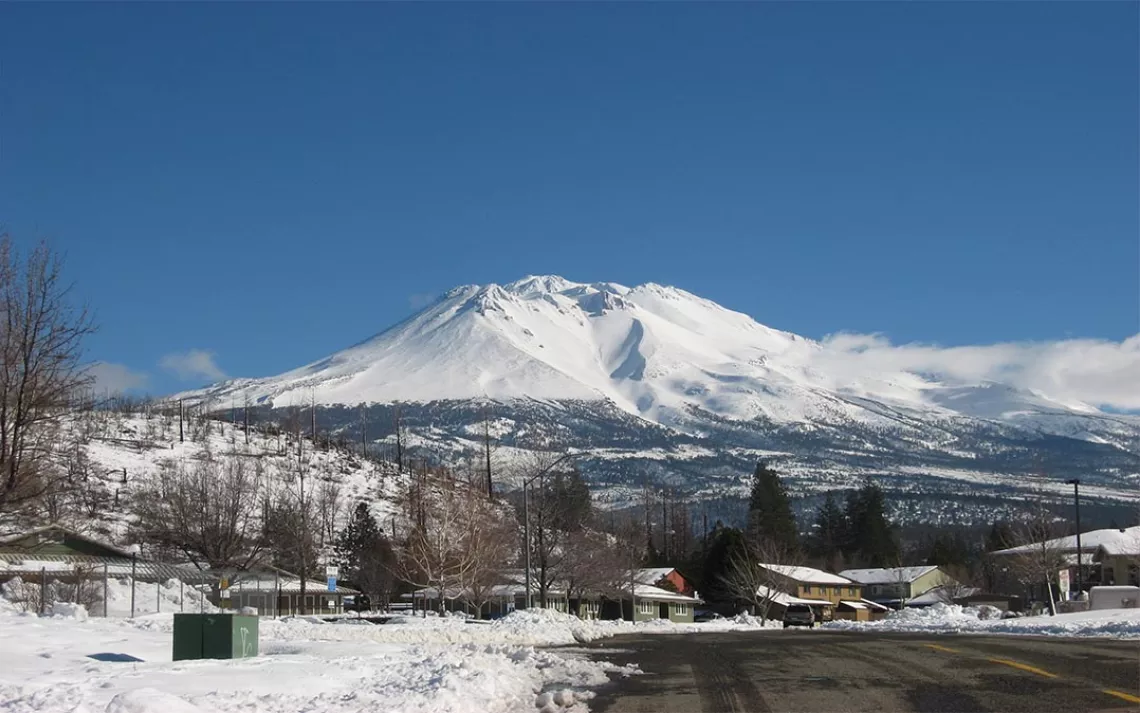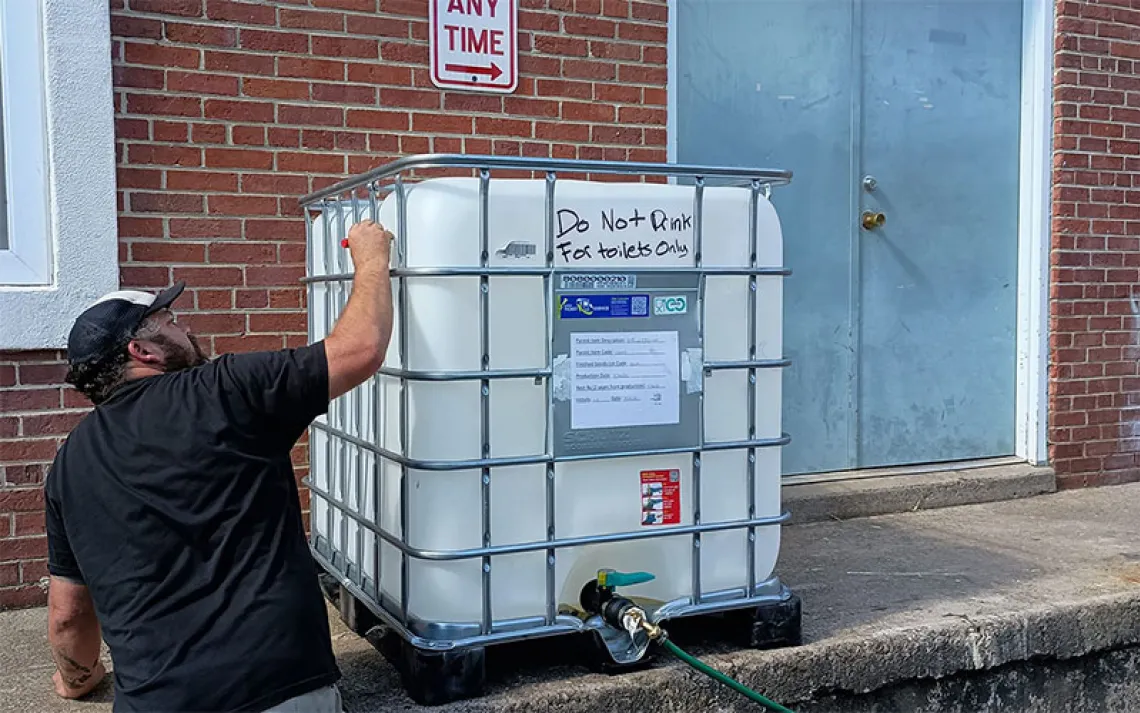Who Owns the Water in Weed, California?
A battle over water rights between town residents and a multi-national corporation taps into deeper, moral questions

Photo courtesy of Michael Yates
When the citizens of Weed, California turn on their taps, pure gravity-fed spring water flows out. It's been that way for over a century. But Roseburg Forest Products (RFP) owns the land beneath the springs. If the Oregon-based timber giant has their way, Crystal Geyser will bottle and ship that water as far away as Japan and locals will need to find another source.
Water rights in this picturesque hamlet, nestled beneath the flanks of Mount Shasta, have pit local control against corporate profit. The outcome will be determined by a Siskiyou County Judge as soon as this summer—or it could take years. While lawyers file demurs and prepare for a day in court, Weed’s 2,800 citizens face an uncertain water future.
The dispute revolves around Beaughan Springs, which is situated in a pine forest a short walk from town. RFP claims that land ownership confers exclusive rights to every drop from the spring, the main source of drinking water for Weed’s residents. Local citizens, city leaders, and the lawyers who represent them claim that the 1932 Shasta River Decree guaranteed a portion of the water for domestic and municipal use.
“We contend the company held the water rights in trust for a specific purpose and if they want to change that purpose they need court permission,” says Weed Mayor Ken Palfini.
Back in 1897, Abner Weed bought the land surrounding what would become the Siskiyou Lumber and Mercantile Mill and the town of Weed for $400. Until the 1960s, Weed was operated as a classic company town.
In 1961, it was incorporated as a city. International Paper, RFP's predecessor, sold the infrastructure for water delivery and sewage to the town, but instead of granting water rights, they signed a 50-year lease for 2.0 cubic feet of water per second (cfs) for $1 a year. That lease expired in 2016.
A year ago, faced with the prospect of having to rent water trucks to supply drinking water, the city declared a state of emergency. At a city council meeting last April, after hours of emotional testimony from over 100 residents, three city council members approved a new Water Lease Agreement (WLA), with two members voting in opposition.
Under the new WLA, the amount of water Weed can use immediately decreases from 2.0 to 1.5 cfs, and the amount the town pays immediately increases from $1 a year to $97,500 a year. The WLA also requires the town to process RFP’s industrial waste, relinquish any rights to the spring in 10 years, and identify a new source of water within three years.
RFP insists they are caretakers of the town. “Roseburg just donated a parcel of land so Weed can rebuild a community center that was destroyed by fire two years ago,” says Ellen Porter, RFP's Director of Environmental Affairs. “We want to partner with citizens and continue to contribute to that community.”
RFP has offered to donate land downslope from Beaughan Springs so the city can dig a well there. But locals say that land is uncomfortably close to a superfund site and well water will be inferior to spring water. “No well in the world can give us that high quality spring water,” explains local school teacher Jim Taylor.
Construction and maintenance of new wells would add about $20 a month to water bills in a town where the median income is $23,000. “That would cost $2.4 million over the next 10 years,” says 90-year old former Mayor Jim Gubetta. “All without buying a piece of chewing gum.”
He contends the WLA is invalid because it was signed under duress. “RFP forced the city into this new lease agreement by threatening to withhold drinking water,” he says.
In June, four residents formed the Weed Area Water Alliance and filed a lawsuit, challenging the city's claim that the lease agreement did not require a full review under the California Environmental Quality Act and alleging that the agreement violates the California Unfair Business Practices Act.
“The new water lease agreement is unconscionable,” says Phil Gregory, of Cotchett, Pitre & McCarthy in Burlingame, California, co-counsel for the plaintiffs. “We are asking the court to vacate that agreement. We assert that RFP is violating public policy with this action. What they are doing is both unlawful and unfair.”
Gregory's colleague Brian Danitz, is confident about how the court will balance the interests of the parties. “On the one hand you have two billion-dollar multi-national corporations [RFP and Crystal Geyser] and on the other hand you have citizens of a small town who have relied on this water for over a century,” he says. “We believe the judge will decide to keep water flowing to the citizens of Weed.”
“Of course we are doing this pro bono,” adds Danitz. “These people are being taken advantage of by two very large corporations who are putting profits over people.”
The city council is considering backing out of the WLA entirely and holding the money in escrow to cover the cost of impending litigation. And citizens are organizing resistance to what they see as a water grab by a greedy company.
The newly formed group Water For Citizens of Weed California (WFCW) held a town hall meeting in late January that drew a crowd of over 100. “To have that kind of a turnout in such a small town is really significant,” says local Bruce Shoemaker, who co-facilitated the meeting. “It's becoming clear that we have a really strong case, and agencies are realizing that they have to take us seriously.”
WFCW wants to secure the rights to the 2.0 cfs of pure spring water on which residents rely. But they're also working on a ballot initiative that would collect two cents in tax for every gallon of water bottled in Weed and shipped out of the county. If successful, that legislation could provide a template for other communities whose economies rely on resource extraction.
Though the ultimate decision in this case will be a legal ruling, many believe that there are deeper moral issues at play. “This water is ours,” explains Shoemaker. “We're not asking for charity or a favor, we're asking for justice.”
 The Magazine of The Sierra Club
The Magazine of The Sierra Club



